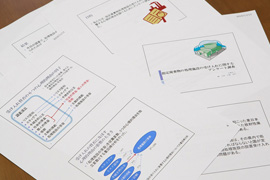- Student life
- Three fields of study
- Student's Graduation Thesis Theme
-
Student Blog
“Every day with Sha-an” - Award History
- Interview with Students
- Interview with Graduates
- Introduction of the Campus
- Campus Festivals
2. Societal Safety Science from the Perspective of Humans
Learning from the perspectives of “earthquakes” and “psychology”
Research Theme
A questionnaire survey on the acceptance of designated waste treatment facilities
Natsuno Ami of the Yukio Hirose research group
(Osaka Prefectural Kitano Senior High School)

Reasons for my interest in this subject
When I was in the second year of high school, the Great East Japan Earthquake occurred. I watched the situation of the afflicted areas on TV. That raised my interest in societal safety, and I am interested in psychology especially so that I make a safe and secure society from the perspective of mental care.
A few years after the earthquake, I learned that the disposal of designated industrial waste from the disaster area had not progressed, and a reason was the feelings of people in the waste destination area. Therefore, I decided on this research theme.
Research Flow

First of all, I learned about the designated waste. Professor Hirose introduced me to a lot of academic papers and references. Waste is classified in various ways. There were many things I did not know, such as the difference between 'designated waste', which takes about 30 years to neutralize the radioactive materials, and 'high radioactive waste', which requires tens of thousands of years to neutralize. I examined technical terms using dictionaries, and also consulted with other members in the group to deepen my knowledge.

The purpose of the questionnaire was to understand the psychological reasons affecting the pros and cons of acceptance for building the designated waste disposal facility. I also wanted to know what factors, if any, may move people to accept it.
I found a questionnaire similar to my topic in a paper on "high radioactive waste". Then, I considered questions with other members of the group.
I created questions as follows. We set the precondition that “You are a citizen of city A. According to the selection method, city A was selected as an installation location for the designated waste disposal facility". After that, we ask the acceptance or refusal of the facilities and psychological reasons for them.
STEP3. Performing the survey A questionnaire survey was conducted for students of the Faculty of Societal Safety Sciences. Because we needed to collect the questionnaire answers immediately, we distributed the questionnaires after lectures held at the lecture hall and collected them on the spot. Because there was not enough response time, there were some unanswered columns. However, we were able to obtain 66 valid responses.

Using the skills of survey analysis learned at practical IT training when we were first- and second-year students, we analyzed what factors make people refuse or accept the facility. Almost every day, we went to the seminar room and analyzed the survey results.
The result of this survey was that “It is easy to accept if the procedures for selection and administration by the government are fair." However, in our real society, people do not necessarily accept the facility even if the procedures are fair. The big difference between the collected data and the current situation was that the survey respondents were students and the number of respondents was low. We couldn’t get the results we expected, and we realized the difficulty of the research. I would like to make use of this experience in my future surveys.
Our next step!
At the research presentation of the Faculty of Societal Safety Sciences, we presented this research in front of about 300 people. We practiced our presentation very hard, and I think that it was an excellent experience. In the question and answer session, I had difficulty with words on the questionnaire and the questions about technical terms, and I realized the difficulty and importance of communicating thoughts clearly.
I learned lessons from this earthquake disaster research experience from the viewpoint of psychology, and I would like to study the disaster prevention regarding the Nankai megathrust earthquakes next.
Checking other fields as well
- 1
Society - Constructing a framework for experts and citizens to study disaster prevention together
- Deepening knowledge about "insurance" necessary for daily life